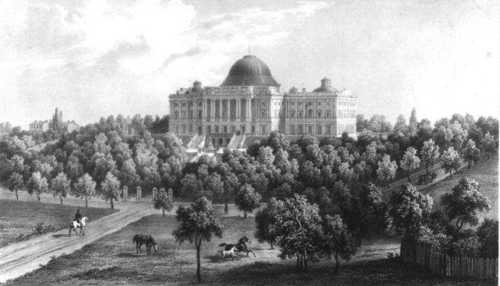In the first days of February, 1837, John Quincy Adams received a petition on slavery. Adams received dozens of such documents every week; he was then virtually the only man in Congress prepared to enrage Southern legislators by presenting public petitions calling for an end to slavery and the internal slave trade. They had responded by imposing an unprecedented “gag” preventing petitions on slavery from being read into the record or referred to committee, as was typically the case. This document, however, was unprecedented, for it purported to come from slaves themselves. What’s more, the signatories opposed abolition, insisting that they wished to serve their masters “as long as life and health will permit.” The document’s author had suspiciously good penmanship and diction, while the actual signatures—“Susan Risky,” “Billy Lukes”—were scrawled down the page. Some signed their last name with an “X.” The petition was plainly a fraud designed to make Adams look ridiculous.
The petition was, in fact, a godsend. Adams wanted to force the Southerners to defend slavery, and thus expose to the public the bloody-minded logic of their “peculiar institution.” At the same time, the gag infuriated him, for he viewed the constitutionally-mandated right of petition as inviolable. On February 6, Adams rose in the House to say that he held in his hand a petition from twenty-two persons “declaring themselves to be slaves.” He did not say what these petitioners sought, leaving the obvious impression that they wished an end to slavery. Since the gag prohibited the presentation of such petitions, Adams asked the Chair to decide whether it could be received—especially since, he noted slyly, it was “one of those petitions which had occurred to his mind as not being what it purported to be.”

The U.S. Capitol in 1839
The South rose as one to denounce the presumption, the fanaticism, the incitement, of presenting a petition from slaves. Dixon Lewis of Alabama Lewis offered a resolution stating that “by extending to slaves a privilege only belonging to freemen,” Adams “directly invited the slave population to insurrection,” and thus should be “forthwith called to the bar of the House, and be censured by the Speaker.” If slaves have the right to petition, Waddy Thompson of South Carolina declared, must it not be conceded that they have as well the right to vote? It was hardly an absurd question.
For three days Adams sat quietly—it must have taken superhuman self-restraint—while his adversaries, making the case for censure, rained down abuse. Only two members defended him. Finally, Adams rose in his own defense. He passionately defended the right of petition, a principle founded on the universal right “to seek for mercy.” Has even the worst despot “ever denied this humble privilege to the poorest or the meanest of human creatures”? Yes, he would present petitions from slaves—or from “a horse or a dog” if it had “the power of speech and of writing.”
Adams now rounded directly upon his accusers, all of whom had fallen into the trap he had set by brandishing the alleged petition from slaves without explaining that those petitioners sought the end of abolitionism, not of slavery. He offered a small bit of advice from an old man to the young: “that when in future they charged others with crimes, first to be quite sure of their facts.” Having enraged his foes, he now exploited their extremism. Waddy Thompson had called for Adams to be subject to criminal prosecution. Do the slave-state representatives, he asked, believe that a member should be criminally liable for seeking to present a petition? If, as Thompson had claimed, the law of South Carolina sanctioned such an act, Adams proclaimed, “I thank God I am not a citizen of South Carolina!” The court reporter tersely summarized the reaction to this last provocation by writing “Great agitation.”
Adams had touched a fault line among the Southerners. Henry Wise of Virginia volunteered that he would never permit a grand jury to sit in judgment upon words spoken in Congress. Adams pocketed the concession and then turned back to Waddy Thompson. “If he thought to frighten me from my purpose,” Adams thundered, “if that, sir, was his object, he mistook his man! I am not to be intimidated by the gentleman from South Carolina, nor by all the grand juries in the universe.” It is unlikely that by that point any member thought otherwise.
By the time the vote was taken, only 22 members could be found to vote for censure. The editor of The Boston Daily Advocate wrote that “The effect of the speech has been rarely if ever exceeded by the influence of any speech on any assembly.” Adams had given courage to his timid Northern colleagues and thrilled the burgeoning abolitionist movement. He had shown what one man could do.
He could only do so much, however. The House voted 162 to 18 that slaves do not have the right of petition. And the gag would not be repealed until 1844.